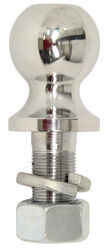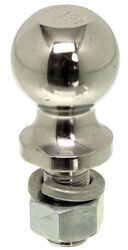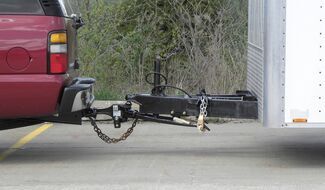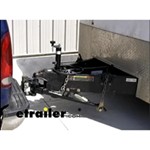
Troubleshooting Trailer Chucking, Jerking, and Tugging on Light Utility Trailer Carrying Two ATVs
Question:
Hello, my trailer has double axle, it weights 525 lbs and has capacity for 2 ATVs on straight line. The weights of the 2 ATV are very different, 718 lbs the heaviest and 438 lbs the smaller one. The GTW including gas & water is 1775 lbs. I loaded the heaviest ATV at the front closer to the tow vehicle. The Tongue Weight measured following your suggested procedure is 110 lbs. I have a Toyota Fortuner 4x4 Diesel with 163hp similar to the 4Runner. When riding, I felt a constant pull like jerking or tugging from the trailer every time I accelerate or decelerate. I also notice that the truck front gets too high looks like it has too much weight in the hitch. I already moved the axles of the trailer back and forward but I can’t find the right position, if I move them forward the trailer starts to sway at high speed, if I move them backwards the truck goes down too much on its back. What do you suggest me to do? Should I increase the tongue weight up to a level close to the 10 / 15 of the GTW now it is only at 6 moving the axles even more to the back regardless that the back of the truck goes down? Would that stop the trailer making that constant “jerking” when accelerating? Thank you very much for your help and best regards.
asked by: Ivan P
Expert Reply:
I believe that I can help you with the tugging you are experiencing. First, consult your vehicles owners manual for the towing capacities and recommendations, and to make sure you are not exceeding those capacities.
Next, there is a formula you can use to determine the best place for your axles. If your tongue weight is less than 10 percent of the gross trailer weight you will first determine what 10 percent of the tongue weight is. 180 pounds is what you will need. Subtract the actual tongue weight (110) from 180 = 70. Divide 70 by the total weight of the trailer. Take the result (0.039) and multiply by the distance from the end of the tongue to the center point between the axles in inches. For example, we will say that distance is 108 inches. Multiply 108 by 0.039 = 4-1/4 inches. Move the axles 4-1/4 inches towards the rear of the trailer.
To deal with a sagging trailer, you will need to add weight distribution if your hitch is rated for use with a weight distribution system. You will need a 2 inch receiver opening. If you have a 1-1/4 inch opening, weight distribution will not work. For a load this light, I recommend Weight Distribution Kit, # 66557. It is designed for tongue weights between 100 and 400 pounds and up to 4,000 pounds gross trailer weight. I have included a link to the instructions for this WD system.
You will need to add a ball to this system. Use # 63845 for a 2 inch or # 63847 for a 2-5/16 inch.
You might also check the trailer connection to the vehicle and adjust the coupler for a tighter fit to the ball. You will also need to make sure the hitch ball you are using is compatible with the coupler on the trailer. The best connection between the trailer and vehicle might help solve the problem. You could also add an anti-rattle device that may help.
I have also included links to our help articles on weight distribution and determining tongue weight for you.

Products Referenced in This Question
2" Hitch Ball - 1" Diameter x 2-1/8" Long Shank - Chrome - 7,500 lbs
- Trailer Hitch Ball
- Trailer Hitch Ball
- Standard Ball
- Chrome-Plated Steel
- 2 Inch Diameter Ball
- 2-1/8 Inch Shank Length
- 1 Inch Diameter Shank
- 7500 lbs GTW
- Class III
- Tow Ready
more information >
2-5/16" Hitch Ball - 1" Diameter x 2-1/8" Long Shank - Chrome - 7,500 lbs
- Trailer Hitch Ball
- Trailer Hitch Ball
- Standard Ball
- Chrome-Plated Steel
- 2-5/16 Inch Diameter Ball
- 2-1/8 Inch Shank Length
- 1 Inch Diameter Shank
- 7500 lbs GTW
- Class III
- Draw-Tite
more information >
Featured Help Information
Miscellaneous Media

Continue Researching
- Shop: etrailer Tongue Weight Scale for Campers and Utility Trailers - 2,000-lb Capacity
- Video: Review of etrailer Tools - Hitch Tools - Measuring Devices - e99044
- Video: etrailer Campers and Utility Trailers Tongue Weight Scale Review
- Search Results: battery connector
- Search Results: andersen
- Search Results: anderson
- Search Results: anderson connector
- Search Results: anderson connectors
- Shop: Towing Mirrors
- Shop: Suspension Enhancement
- Shop: Hughes Autoformers Safe View Smart Power Inlet - 30 Amp - LED - Black
- Shop: K-Source Snap & Zap Custom Towing Mirrors - Snap On - Driver and Passenger Side
- Shop: Firestone Ride-Rite Air Helper Springs - Double Convoluted - Rear Axle
- Search Results: scale
- Search Results: weigh safe hitch
- Q&A: How to Correct Surging or Bucking When Towing 5th Wheel Trailer Using Gooseneck Adapter
- Q&A: Troubleshooting Jerking/Lunging When Towing Trailer that Has Andersen Fifth Wheel Gooseneck Adapter
- Shop: K-Source Universal Towing Mirrors - Clip On - Convex Mirror - Qty 2
- Shop: Air Lift Ride Control Air Helper Springs - Rear Axle
- Shop: Air Lift LoadLifter 5000 Ultimate Air Helper Springs with Internal Jounce Bumpers - Rear Axle
- Q&A: Can a Trailer Ride With the Tongue at an Upward or Downward Angle
- Article: Which Sway Control Hitch is Right For Your Trailer?
- Video: CIPA Dual-View Clip-on Towing Mirror Installation - 2020 Jeep Gladiator
- Article: 5 Things to Know About Weight Distribution Hitches
- Article: How to Measure for Trailer Hitch Drop
- Article: Determining Trailer Tongue Weight
- Shop: Brake Controller
- Q&A: What is Max Safe Tire Temperature
- Video: Lippert RV and Trailer Tire Linc TPMS Review and Installation
- Shop: Trailer Hitch


































Shawn
6/14/2020
I replaced the tires (brand new) on my pontoon boat trailer and now its bucking and jerking. What is causing this?